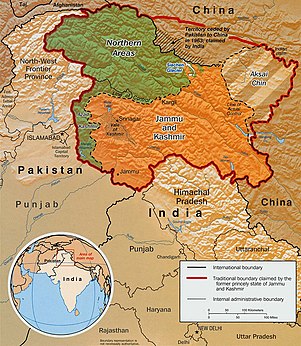This article has multiple issues. Please help improve it or discuss these issues on the talk page. (Learn how and when to remove these messages)
|
Saltoro valley is the highest valley in Pakistan and is located within the region of Baltistan.[1] This valley is under the administration of Pakistan and is situated near the Saltoro Mountain Range which includes the prominent Saltoro Kangri peak and the Saltoro River. Saltoro Valley is in proximity to the Siachen Glacier, which is the world's highest battleground and a disputed territory between India and Pakistan.[2][3]
| Saltoro Valley | |
|---|---|
| Geography | |
| Location | Baltistan, Pakistan |
| Rivers | Saltoro River |



The Actual Ground Position Line (AGPL) divides the region held by India and Pakistan in the disputed Siachen area, running through the Saltoro Mountain Range. In this area, higher peaks and passes are held by India, while Pakistan occupies the lower peaks and valleys.[4] In 1984, India conducted Operation Meghdoot, capturing most of the contested Siachen area.
In April 1986, Pakistan launched an assault in the region and gained control of a high point south of Bilafond La, establishing a military post on this peak, which they named "Quaid Post" in honor of their leader,Quaid-e-Azam Muhammad Ali Jinnah.[2][3] However, between June 23 and June 26, 1987, India initiated a counter-operation named Operation Rajiv, recapturing the post from Pakistan. They renamed it Bana Top, in tribute to Bana Singh, who had been awarded India's highest gallantry award, the Param Vir Chakra.[5][3][2]
See also
edit- Near the AGPL (Actual Ground Position Line)
- NJ9842 (peak) LoC ends and AGPL begins here
- Gharkun (peak)
- Gyong Kangri (peak)
- Gyong La (pass)
- Goma (Siachen)
- Gyari (valley)
- Chumik Kangri (peak)a
- K12 (mountain) (peak)
- Bana Top (peak)
- Bilafond La
- Saltoro Valley
- Ghent Kangri
- Sia La
- Sia Kangri
- Indira Col
- Operation Vajrasakti / Qaidat
- Borders
- Actual Ground Position Line (AGPL)
- India–Pakistan International Border (IB)
- Line of Control (LoC)
- Line of Actual Control (LAC)
- Sir Creek (SC)
- Borders of China
- Borders of India
- Borders of Pakistan
- Conflicts
- Kashmir conflict
- Siachen conflict
- Sino-Indian conflict
- List of disputed territories of China
- List of disputed territories of India
- List of disputed territories of Pakistan
- Northern Areas
- Trans-Karakoram Tract
- Operations
- Operation Meghdoot, by India
- Operation Rajiv, by India
- Operation Safed Sagar, by India
- Other related topics
- Awards and decorations of the Indian Armed Forces
- Bana Singh, after whom Quaid Post was renamed to Bana Top
- Dafdar, westernmost town in Trans-Karakoram Tract
- India-China Border Roads
- Sino-Pakistan Agreement for transfer of Trans-Karakoram Tract to China
References
edit- ^ "Saltoro Valley : Photo Albums : SummitPost".
- ^ a b c Kunal Verma (2012). "XIV Op Rajiv". The Long Road to Siachen. Rupa. pp. 415–421. ISBN 978-81-291-2704-4.
- ^ a b c Ajai Shukla (30 May 2011). "Army watches as Siachen dialogue resumes". Business Standard.
- ^ How India realised it was at risk of losing the Siachen glacier to Pakistan, The Print, 12 April 2018.
- ^ "Naib Subedar Bana Singh". Bharat Rakshak. Archived from the original on 5 March 2015. Retrieved 27 June 2014.